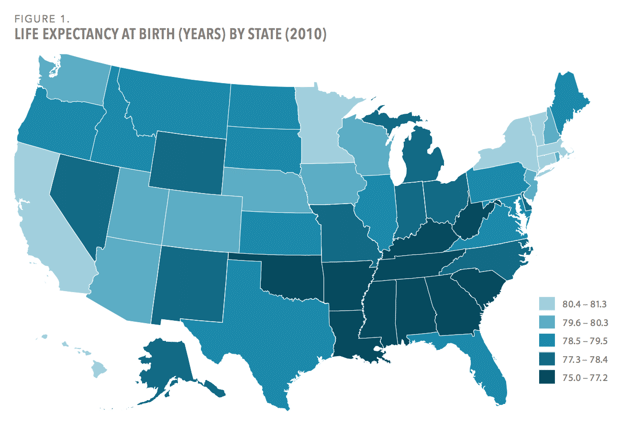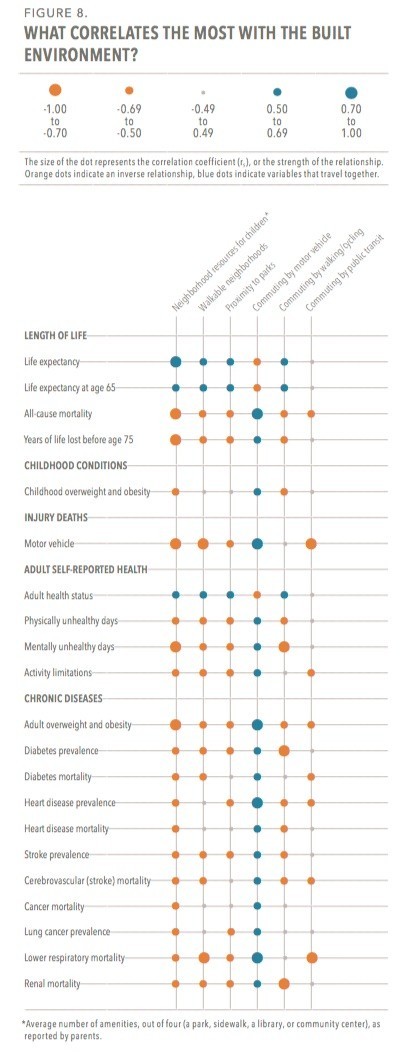Connecting state and local government leaders
Socioeconomic conditions outrank all others factors in determining well-being.
In 2013, the National Research Council and the Institute of Medicine published a report showing that Americans die earlier and experience poorer health than residents of other high-income countries, such as Australia, Finland, and Japan. Though such international comparisons are concerning, health differences within the United States are even larger. Studies have found, for instance, that in many American cities life expectancy varies by as much as 20 years between neighborhoods.
A recent study by researchers at Virginia Commonwealth University (VCU) in collaboration with the Urban Institute, “The Health of the States,” takes a deep dive into these U.S. health disparities and the factors shaping them. The study examined states’ data on 39 different health outcomes, such as mortality, sexually transmitted diseases, and diabetes, and measured how strong they correlated with 123 health determinants, such as smoking, neighborhood walkability, and income level.
VCU launched a summary of the results in October 2016, and has since been periodically rolling out “spotlights” on particular life stages, such as birth and adolescence. Last week, the university published the seventh spotlight—out of a total of nine—on how adults report their health status. While the results of the study naturally vary according to the data being considered, the research revealed a number of broad trends.
The health challenges that the Deep South faces is one such finding. The states with the worst outcomes were Mississippi, Louisiana, and Alabama, followed by Kentucky, West Virginia, and Arkansas. The healthiest states were more likely to be in New England, the West, and the Midwest: Utah, Massachusetts, and Hawaii came in first, followed by Connecticut, Vermont, and Minnesota.

Yet the real value of the research isn’t in the rankings per se, but what causes them. The study’s authors found that while health behaviors, such as smoking, are important in determining health outcomes, socioeconomic factors are even more important. “The correlation between factors such as median household income and educational attainment was strongest in predicting life expectancy and health outcomes from birth to old age,” says lead author Steven Woolf, the director of the Department of Family Medicine and Population Health at VCU. “Many of the differences we see in health across the states have a lot to do with this.”
Woolf adds that the health behaviors we often think of as related to self-control or self-motivation, such as diet and exercise, are themselves influenced by socioeconomic factors. “Your education and income level determine, for example, whether you can afford a neighborhood with a grocery store with fresh, healthy food,” he says. “And that determines whether you and your children have the opportunity to eat well.”
The study found time and again that such factors play a major role in people’s health, as does location. For instance, places with healthier built environments—those that promote walking and cycling over driving and provide accessible green spaces—have residents with a longer life expectancy, less obesity, and lower rates of chronic disease like diabetes. The study also found that residents of these greener states report fewer mentally unhealthy days. In the chart below, you can see the correlations between elements of the built environment and health outcomes. Note how commuting by car, for example, is strongly linked to higher obesity and heart disease (as well as traffic deaths).

Research of the past two decades has increasingly stressed the social determinants of health, making the Health of the States Report consistent with much recent work in the field, such as this recent study out of the U.K. connecting spread-out suburban living with higher rates of obesity. But the breadth and depth of the research is new, and the focus on states is potentially advantageous in terms of policymaking. As the report notes, “States have considerable autonomy to implement policies that can strengthen health outcomes.”
The study found that states with higher taxes on cigarettes have lower smoking rates—and longer life expectancy and lower death rates, particularly from tobacco-related illnesses. And some health outcomes were more favorable in states that had expanded Medicaid coverage under the embattled Affordable Care Act.
But the larger policy takeaway is that health outcomes improve when the government spends more on social services than on health services. Though spending on preventive services such as cancer screenings and immunizations is effective, most health care dollars go to treatment, especially of end-stage disease, which is less relevant to overall health. And health care as a whole is thought to account for only 10 to 20 percent of health outcomes.
“What doctors and hospitals do is important,” says Woolf, “but the degree of their effect is marginal when compared to socioeconomic factors.” As such, the study found a strong correlation between government spending on income support and infrastructure—particularly mass transit—and better health outcomes.
The problem, Woolf says, is that legislators often cut spending in areas like education while maintaining or increasing spending on health care. (The United States spends more per capita on health care than any other country.) The results are harmful: In Mississippi, for example—the state that came in last for health outcomes—income assistance has declined by more than 7 percent over the past two decades. The states with the healthiest populations do the opposite of Mississippi by supporting social safety nets.
Woolf recommends that states alter their spending accordingly, and that the private sector also do its part, such as through investments in education, job training, affordable housing, and local economic development.
Some companies already understand that such spending not only improves their employees’ health, but also increases their productivity and lowers health care costs. “That’s why you see some corporations donating to and promoting early childhood education programs like Head Start,” says Woolf. “They know the bottom line and they know the benefits.”
Mimi Kirk is a contributing writer to CityLab, where this article was originally published with the help of a grant from the Robert Wood Johnson Foundation.

NEXT STORY: ‘Farm to Flask’ Distillers Lifting Local Spirits



